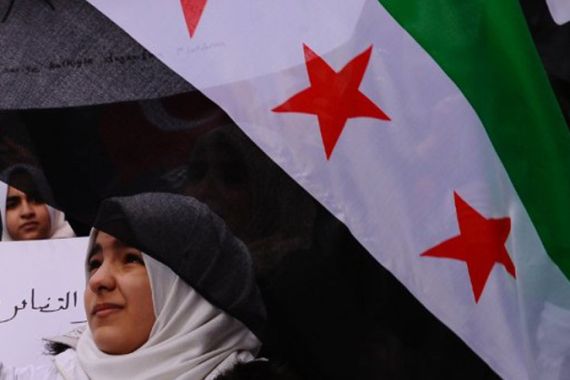
Syria’s deep divide
A group of Syrians gather in The Cafe to debate their country’s future.
Against all odds, the Syrian people rose up to demand change in their country nine months ago. Inspired by the revolutions in Tunisia, Egypt, Libya, Yemen and Bahrain, they wanted an end to the rule of the Assad family which has been in place since 1970.
|
Unedited version: Part one |
But the revolution has stumbled. Massive peaceful marches were brutally quashed by the security apparatus of the state and unofficial enforcers known as ‘shabiha’.
More than 5,000 people have been killed. Now the protests are quick and fragmented, unlike the sustained sit-ins of Tahrir Square that toppled the regime of Hosni Mubarak, the Egyptian president.
The Syrian government alleges that “armed terrorist groups” have killed hundreds of security personnel, and there are worries that Syria is descending into civil war.
Defectors from the Syrian army have banded together to form the Free Syrian Army and carry out attacks against military targets.
Sectarian divisions between the majority Sunnis and minorities (including Alawites and Christians) are on the rise.
|
Unedited version: Part two |
Many Syrians worry about a repeat of the Iraqi scenario, which pitted Sunnis and Shias against each other in a bloody cycle of ethnic cleansing in 2006 and 2007.
Adding to the complications are the divisions within the Syrian opposition.
Inside the country, dissidents try to remain underground, but thousands are in jail.
Outside the country, Syria’s exiles have come together to form the Syrian National Council (SNC), an umbrella group of disparate opposition parties, to lobby the international community to take action against the government of Bashar al-Assad. But the SNC’s effectiveness remains in question.
Can the Syrian revolution succeed? A group of Syrians gather in The Cafe in Beirut to debate their country’s future.
|
Our Coffee Mates on this episode: – Moaz al-Sibaai is a member of the Syrian National Council originally from the city of Homs. He has lived in exile since 1977. – Emma Suleiman is a communications and marketing professional who lives abroad. She said she has received death threats from unknown individuals inside Syria after voicing her criticism of the al-Assad regime this year. – Waddah al-Khatib is a professor of English literature at Damascus University and a vocal supporter of the government. He used to teach in the US, but returned to Syria 10 years ago. – Loulwa al-Atasi is a Syrian who lived most of her life in Canada. Six years ago she returned to her homeland, and now works for a real estate developer. She is also the co-owner of a food and beverage consultancy in Damascus. – Fadi Salem is a native of Aleppo who lives and works in Dubai as a social media strategist. Skeptical of media reports on Syria, he recently went on a road trip throughout the country to decide for himself. – Hydar Kazwini is a recent graduate of English from Damascus University. He studied English in the hope of being able to leave the country, but that never materialised. Permanent work never materialised either. He worked for a while in domestic tourism, but that has collapsed since the uprising began. – Alaa Ebrahim is a freelance journalist based in Damascus, who frequently works for Syrian TV. |
PRODUCER’S NOTE: This episode of The Café was different to the rest. For starters, it was filmed in Lebanon, not Syria. All the guests are Syrians, but Al Jazeera is banned from working freely in Syria, as are most news outlets.
To give you a fuller picture of the debate on such a contentious issue, we are providing the unedited version of the show here as the version that aired on TV was cut for time.
We welcome your questions and comments. You can reach us anytime at: progfeedback@aljazeera.net
The Cafe airs each week at the following times GMT: Friday: 2000; Saturday: 1200; Sunday: 0100; Monday: 0600. Click here for more on The Cafe. |
